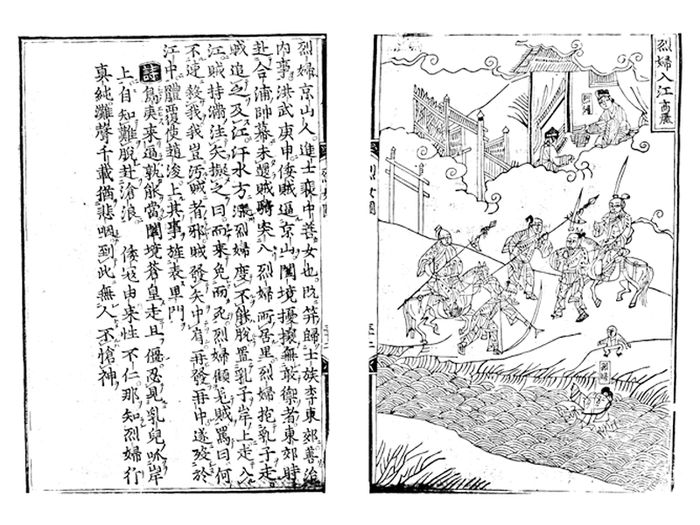(Translation) 烈婦入江
| Primary Source | ||
|---|---|---|
 |
Title | |
| English | ||
| Chinese | ||
| Korean(RR) | ||
| Text Details | ||
| Genre | ||
| Type | ||
| Author(s) | ||
| Year | ||
| Source | ||
| Key Concepts | ||
| Translation Info | ||
| Translator(s) | Participants of 2018 Hanmun Summer Workshop (Intermediate Training Group) | |
| Editor(s) | ||
| Year | 2018 | |
Original Script
【詩】島夷來逼孰能當. 闔境蒼皇走且僵.
忍見亂兒呱岸上. 自知難脫赴滄浪.
倭寇由來性不仁. 那知烈婦行眞純.
灘聲千載猶悲咽. 到此無人不愴神.
Translation
Student Translation : Petra Sváková
A devoted wife enters the river
The devoted wife, a person of Kyŏngsan, was chinsa1 Pae Jungsŏn's daughter. She had already passed the age of 152 and got married to I Donggyu of a literati family. She was good at managing internal matters. In the Kyŏngshin year of Hongmu's reign3 Japanese pirates were oppressing Kyŏngsan. They surrounded the place and caused troubles. [There was] nobody who would dare to resist. Donggyu, at the time, went to Happ'o to commander's headquarters [but] did not come back. The bandits' cavalry suddenly entered the town [where] the devoted wife was living. The devoted wife embraced a baby she was breastfeeding and ran away. The bandits chased after her until the river. The river water was just then increasing. The devoted wife figured that she could not escape. She put the baby down on the riverbank and running entered the river. The bandits draw bows and with all strength directed arrows, targeted her and said: "You, come [here], if not you will die." The devoted wife turned around and looked at the bandits, [while] scolding [them] she said: "Why don't you kill me quickly? How could I be blemished by [those who are] the bandits?" The bandits shot the arrows and hit [her] shoulder. They shot again and hit [her] again. Thereupon she died inside the river. Ch'eboksa4 Chojun sent the matter up and a banner was displayed at the gate of the town.
1 進士 - literally meaning is 'an advanced scholar', in the Chosǒn period it was a scholar who has only passed the first examination for office.
2 笄 - a large pin for holding hair, girls began to wear this pin when they were at the age of 15.
3 洪武庚申 - should mean the 57th year of the emperor Hongmu(ch. Hongwu)'s reign(1368 - 1398). However, this is a year of the reign of his son Yǒngnak (ch. Yongle; 1402 - 1424) who usurped the throne from his nephew and dated the first year of his reign as the '35th year of Hogmu's reign (洪武三十五年)'. Thus 洪武庚申 is 1424.
4 體覆使 - an official who received an order from the king and had to go to provinces to investigate crimes connected to the military affairs.
- Discussion Questions:
- Discussion Questions: